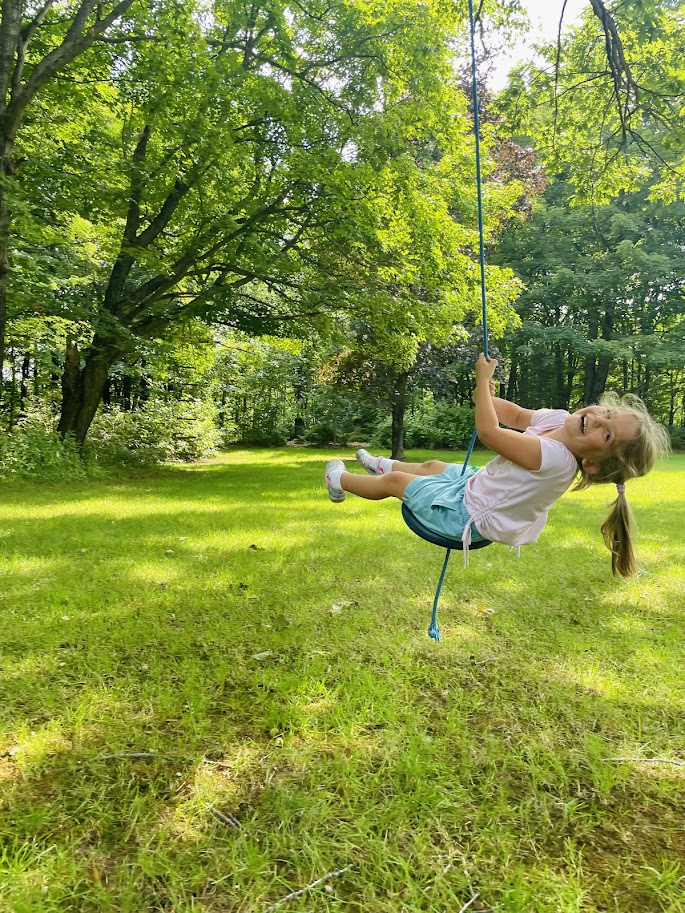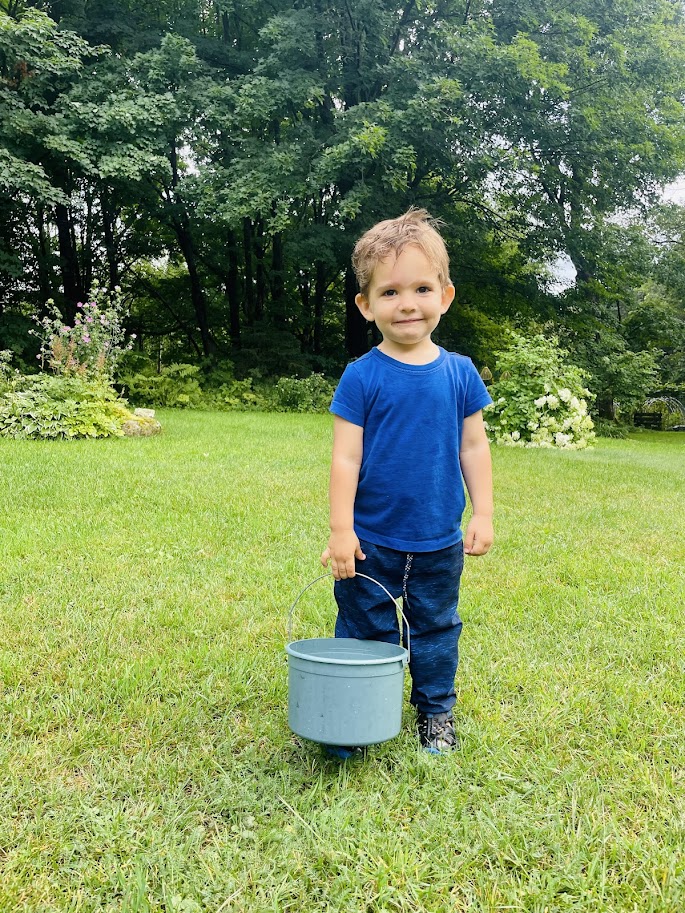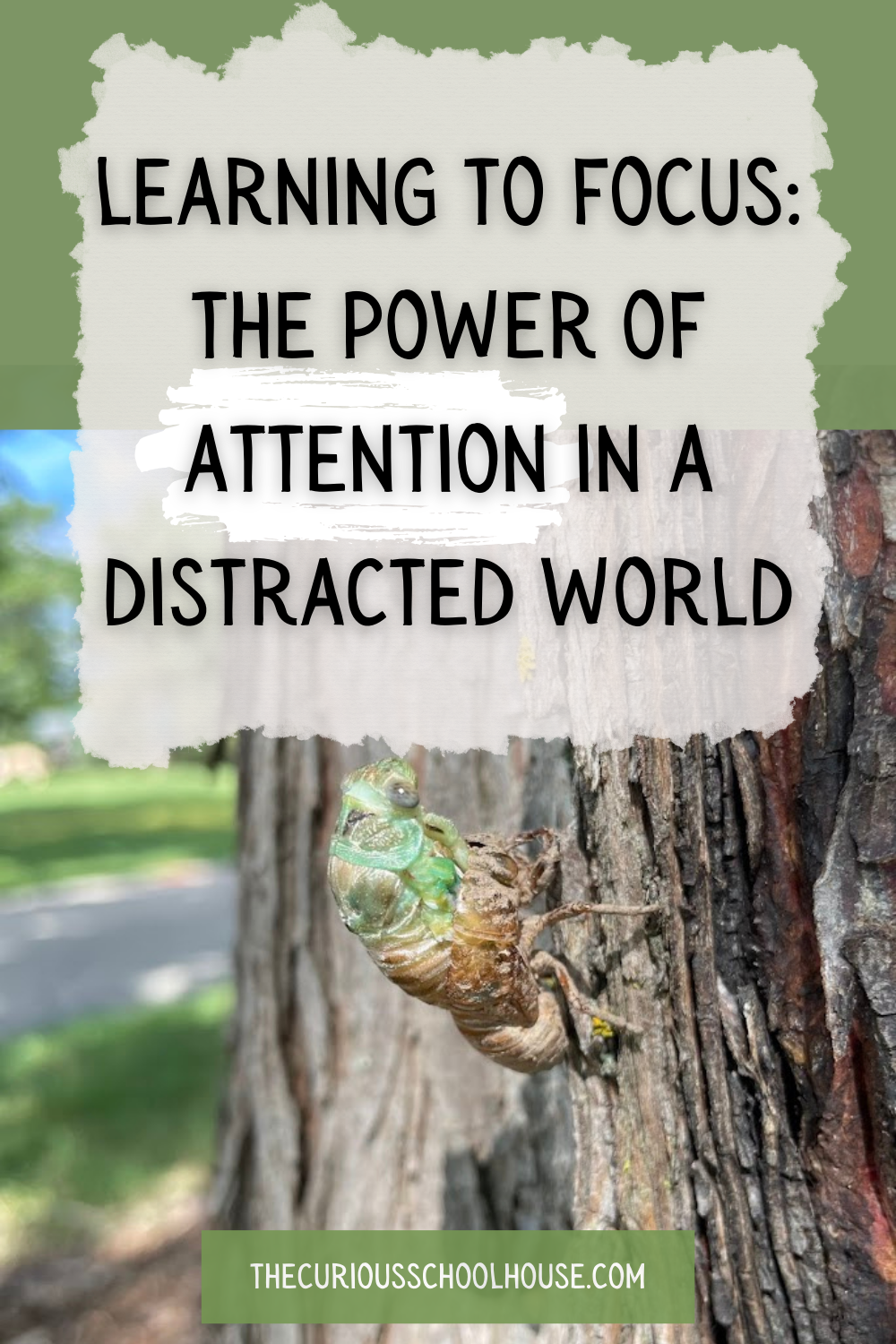Learning to Focus: The Power of Attention in a Distracted World
In this post I share four key strategies that we can use to help our children learn to pay attention. Learning to focus is crucial to our child’s success, both in school and in their adult life!
“What is the goal of education?”
This was the question posed by veteran homeschooler and writer Cindy Rollins, in an online “back to homeschool” conference that I was watching from the comfort of my couch. It’s a fascinating question, with any number of possible answers. Ask a hundred different people and you will likely get one hundred different answers! How would you answer it?
Here are just a few of the answers that I have heard and resonated with; perhaps you have heard these too!
The goal of education is…
… to grow in knowledge, skill, and character.
… to learn to order your affections: to love what is good, true, and beautiful.
… to learn to think and act rightly.
However, the answer that Cindy gave was simply one short word, and it was an answer I had never considered before:

“Attention.”
I was struck by this simple answer, and spent (probably too much) time thinking about it. Her reasoning behind this answer was simply that without the ability to choose to focus your attention on the task at hand (whatever that might be), you will learn nothing. Everything else, as good and worthy as it may be, comes after this prerequisite skill. Whether or not you agree with this answer, it’s well worth our time as homeschoolers to think about what activities increase our child’s attention span, and what activities detract from their power of attention. Perhaps you will decide that “attention” is not your main goal of education, but it’s hard to make a convincing argument that it’s not still important.
“It is impossible to overstate the importance of this habit of attention. It is, to quote words of weight, ‘within the reach of every one, and should be made the primary object of all mental discipline’; for whatever the natural gifts of the child, it is only so far as the habit of attention is cultivated in him that he is able to make use of them.” ~ Charlotte Mason, Home Education
If it is true that your child will learn and retain nothing from their education without the ability to attend to it (focus on it) without distraction, I see two main options for educators: we can make sure that all material we present to the child is as flashy and attention-grabbing as possible (in which case the burden for attention and therefore for learning rests upon the teacher and the material); or, we can deliberately work to increase the child’s natural attention span (in which case the responsibility for learning rests upon the child and his/her own abilities).
I’m going to go out on a limb here and say that public school – and 99% of all traditional education – chooses the first path. How can we take the information we want these children to learn and make it exciting, fun, interesting, shocking, flashy… anything at all to catch their attention?
For the record, I am not against making learning fun. Or interesting, or exciting! We do this often and it’s great. I love having fun with my kids!
However.
It’s demeaning to the child and disrespectful to the content itself if we assume that the only way our child will find math interesting is if it taught by an animated bear dancing across a screen with balloons. What this teaches the child, much more effectively than whatever math concept might happen to come along with it, is that math is not interesting for its own sake. Math is not beautiful or fascinating enough in its own right, so here are a few cartoon figures to help you trudge through this horribly dull subject. Good luck!
Or, perhaps the child will take away a slightly different but even more disheartening message: you are not capable of enjoying or understanding these ideas on your own – unless we help you out with some “age appropriate” attention-getters.
If this makes us uncomfortable – if we feel that there must be a better way – and we decide against this traditional schooling path, where does that leave us? What other, uncommon path can we take to ensure that our child pays attention to their education?
We must make it a priority to encourage the habit of attention in our homeschool, and thankfully there are some very specific ways we can do so.

Learning to Focus: 4 Ways to Encourage the Habit of Attention
Learning to Focus through… Reading
This includes both the books that your child reads independently and the time you spend reading aloud to them. If you sit down and try to read a book to a child who has not yet grown accustomed to reading, you will quickly find out that listening to words and sitting (mostly) still is a learned skill! Children are not born with this skill, and for some it is much more difficult than others.
Here’s a simple comparison: the average length of a camera shot in a movie is between 3-8 seconds (and decreasing in recent years), which means that that is the length of time you must focus on the movie before having your attention grabbed by a new camera angle. You might think your child is “focusing” for two full hours as they watch their favorite movie, but in reality, our attention is grabbed by every new camera angle and every new scene, which means that it takes very little focus or attention in order to enjoy a movie.
In contrast, when I read the classic book Blueberries For Sal to my two-year-old this morning, the length of time it took me to read each page was between 10-30 seconds (yes, I timed each one), with a third of the pages being over 20 seconds long. If we are feeling generous and say that camera shots in movies are about 5 seconds long (many, if not most, are shorter), this means that sitting through this relatively short children’s book requires four times the attention span that your average movie requires – not to mention the fact that the pictures in the book are not moving! What a wonderful exercise in learning to focus! Keep reading to your child and their attention span will inevitably grow.
Learning to Focus through… Time in Nature
“An observant child should be put in the way of things worth observing.” ~ Charlotte Mason
God’s creation is the exact opposite of flashy entertainment, and as such, it is a generous giver of gifts to those who will simply pause and pay attention. Take a walk through the woods, stop in the middle, and look around you – your first impression will probably be that nothing is happening. However, the longer you linger, the more you will see. It’s truly amazing! Children are naturally good at this, and have much to teach us about the magic found even in our simple backyards.
Yesterday I noticed my five year old daughter crouched down in our driveway watching some ants. I came over to see what she was looking at, and saw a pair of ants working together to pull a large chunk of food across the cement. We watched them run around the food, try different angles, and eventually settle on an arrangement with both of them side by side pulling in the same direction. It was fascinating! I don’t think I’ve ever seen two ants working together like that, and it prompted all sorts of questions, such as “How do they talk to each other? Is one of them the boss? How do they know where to take the food? What if they get stuck and need another ant?”
Time spent in nature increases our attention span because we quickly learn that our patience is rewarded and that the best discoveries come to those, no matter how small, who stop and pay attention.
Learning to Focus through… Gentle Encouragement
This could come in the form of, “Let’s just read one more page!” or “Don’t run away quite yet – can you find the the blue truck in this picture?” If your child is squirmy and losing attention in their book or puzzle or project, we can gently encourage them to focus just a tiny bit more. There might be occasions when they are sick or overtired and it is not the right time to push them, but most of the time, we can nudge them just a bit further. Just do one more piece of the puzzle, one more page of the book, one more minute on the project!
If we do this every time, they will keep stretching and growing this attention muscle and their ability to focus. Timers are also a great help with this! Set the timer for just one minute and ask your older child to keep writing until it rings. Ask them to practice their math facts for just two more minutes. Having a visual aid (timer) that tells them exactly how much longer they have to work is reassuring and makes it easier to push through. These little bits of time truly add up and help our child to grow their attention muscles!
Learning to Focus through… Not Repeating Yourself
“A single reading (of their school books) is insisted on, because children have naturally great power of attention; but this force is dissipated by the re-reading of passages, and also, by questioning, summarising, and the like.”
“To allow repetition of a lesson is to shift the responsibility for it from the shoulders of the pupil to those of the teacher who says, in effect,—’I’ll see that you know it,’ so his pupils make no effort of attention. Thus the same stale stuff is repeated again and again and the children get bored and restive, ready for pranks by way of a change.” – Charlotte Mason, A Philosophy of Education
I’ve been guilty of this far too many times. You know how it goes: you carefully teach your Sunday school lesson to the class of wiggly 4 and 5 year olds, then ask them a question about what they just heard a mere 5 seconds earlier, and all you get in return is blank stares. So, you heave a sigh and start explaining it again, giving more and more hints until someone – anyone!! – can guess at the correct answer. Then you smile and think, “Now they understand it!” The problem with this approach is that every time we do this we are teaching the children that they do not need to pay attention the first time.
It’s a similar idea to the questionable parenting technique of “counting to three” – what the child learns, because he is intelligent, is that he does not need to listen or respond until Mom gets to two (or maybe two-and-a-half). And then, because he is intelligent, he will get in the habit of not listening at all until he can hear Mom’s volume go up and her temper reaching the boiling point. Why should he, when he’ll always have another chance? This is not to say that we should never repeat ourselves, and perhaps Sunday school is not the best place to start teaching children to focus, but the more this happens in our child’s life, the more she will learn that she does not need to pay attention because Mom will eventually give her the correct answer anyways.
Narration is an excellent way to practice this idea at home. You read a short passage from an interesting book, just once, and then wait to hear what the child will “tell back” about it. Because there is no one right answer – every child will “catch” something different from a passage, and each narration will be unique – it’s no use for the child to guess and beg for hints. They are forced to pay attention, because Mom will not read it again and guessing won’t get them anywhere! And yes, if you are wondering, there is still grace in this process, and I will frequently remind our children of tricky names or places that are hard to remember – but as they get older they will hopefully need this less often.

Special Bonus: 1 Way to Decrease Your Child’s Attention Span
Learning to (Not) Focus through… Screens
Don’t hate me for saying this, but it is true! I see it in myself just as much as in my children. I have a harder time focusing on writing or reading when my phone is even in the same room as me, because there’s always a temptation to check it for notifications – even if I have them silenced. If this is true of me, at 38 years old and with (hopefully) a fair amount of learned self-control, how much more true is it for our children?
Our phones are designed to be distracting: the more time we spend on them, the more money the app developers make. As I shared above, movies and tv shows fragment our attention into tiny 2-4 second clips. “Educational” games on your iPad might teach your child their ABCs, but the colorful images and flashing graphics also decrease their attention span because the child does not have to work to pay attention. Their attention is easily held without any effort on their part! And again, if you are in the traditional education system, you may see this as a wonderful thing. But if you want your child to have the skill of paying attention, the ability to focus even on a difficult or less-exciting task, these screens are working against you.
Let me say it once more: screens are not helping you (or your child) in your goal of learning to focus! This is not to say that we can never use them, but simply that we must be aware of how they detract from our ability to focus and then use them judiciously.

Learning to focus can feel like the upmost of the uphill battles in our fast-paced, technologically-driven modern world, but the rewards are great! Every child in this world has innate talents (yours and mine included) but their ability to make the most of them will be limited by their ability to focus and pay attention.
If our children can learn this – if we can learn this! – then the world will open before us.
“The man who can make himself do what he wills has the world before him, and it rests with parents to give their children this self-compelling power as a mere matter of habit.” ~ Charlotte Mason








Great post! Our secret used to be reading from a chapter book before we sat down to work. We discovered “accidently” how much more relaxed & focused the boys were! 😁
great idea!
This is SO good! The “not repeating yourself” is challenging for me- ha!
i know, me too! 🙂
This article was perfect timing for me. I was just about to search through your blog on this very topic. This week of homeschooling has been a major fail. The problem is my oldest child can literally do oral arithmetic math problems quicker than I can, yet 15 out of 20 minutes of the lesson is working on him just focusing! This was very interesting, especially about the TV angles changing and the attention span. Thank you this article about learning to focus gave me some things to think about!
Such a good, helpful post! As they used to say in my church growing up, I had to say “ouch and amen” to some of the things! haha But so, so good!